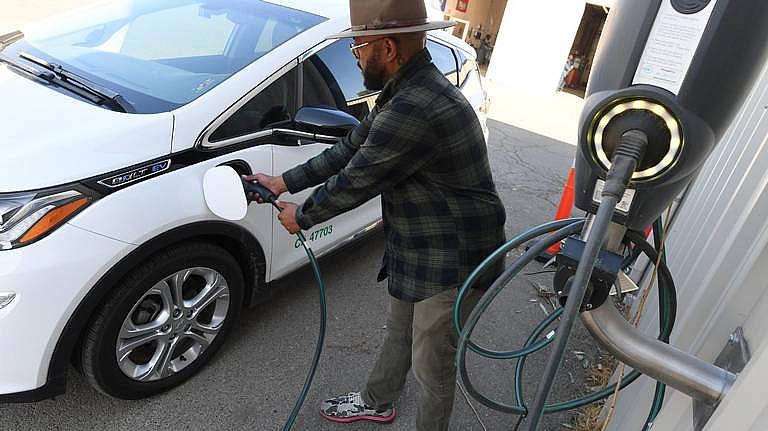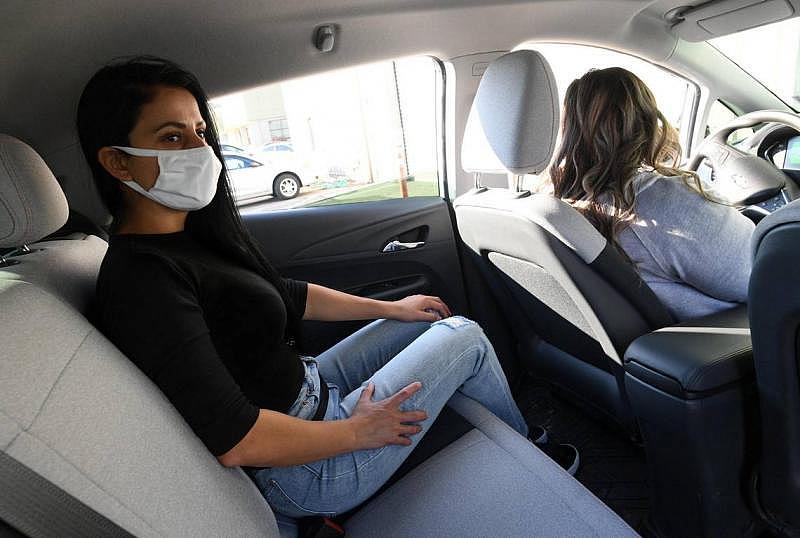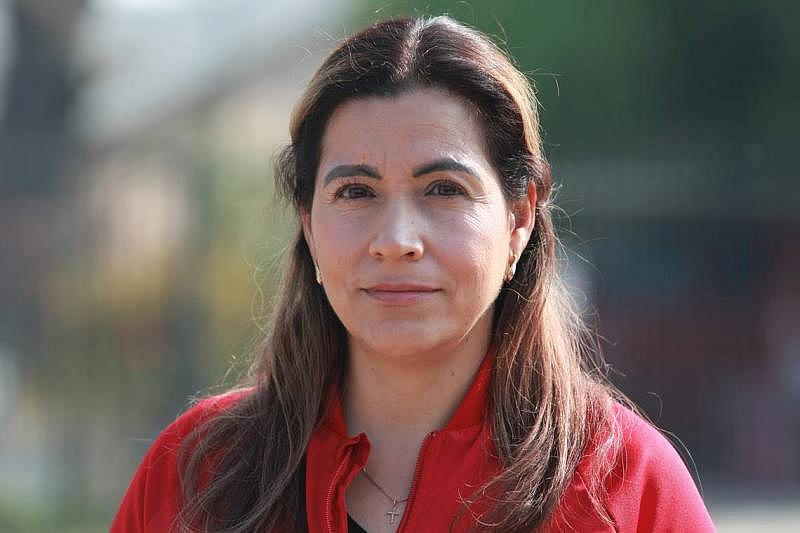Fresno County’s rural residents face transportation gaps. How electric rideshare programs help
This story is part of a series produced as a project for the USC Annenberg Center for Health Journalism’s 2021 California Fellowship.
Other stories includes:
What’s Measure C? Why Fresno County could be voting on another sales tax measure
This Week in Fresnoland: What is transportation justice?
Left out and overlooked: How rural Fresno County roads and transit are neglected
‘There’s a big need.’ How a lack of public transit impacts people in rural Fresno County
Are Fresno’s car-less residents being left behind? What it means to our community
Fights over budgets, buses & sprawl threaten Fresno County’s Measure C transportation tax

The Fresno Bee
West Park resident Maria Del Carmen Valencia had to walk miles to the nearest grocery store and could not work because of lack of transportation access. Many rural Fresno County residents do not have reliable access to public transportation options.
By MARÍA G. ORTIZ-BRIONES and CASSANDRA GARIBAY
Gregorio Hernández López has been on both sides of the equation when it comes to The Latino Equity Advocacy & Policy (LEAP) Institute’s Green Raiteros electric vehicle ridesharing program, which started in Huron to serve the residents of the rural west Fresno County community in dire need of transportation.
The 67-year-old was one of the ‘raiteros’ (drivers) who drove people to their essential appointments.
Now, Hernández López is one of the clients — a passenger in need of rides to his own medical appointments.
“It is very important because we are a community that is far from hospitals. We are far away,” he said in Spanish of the ridesharing program. “There was before the Coalinga hospital, but since they closed it, it is already very difficult to attend or to be taken to one very close.”
The Green Raiteros program has driven patients, many of whom are farmworkers, to Hanford, Fresno, Bakersfield and Valley Children’s Hospital in Madera County as well as to Coalinga, 20 miles from Huron, Huron Mayor Rey Leon said.
Fresno County Regional Transit Agency (FCRTA) provides the Huron inter-city “life line” service to Coalinga — two round trips with two 90-minute shuttle periods in Coalinga for passenger drop-offs and pick-ups, Monday through Friday, 9 a.m. to 5 p.m. — a result of funding from Measure C as well as federal and state grants.
However, León, who is also executive director of The LEAP Institute, said that because the bus is on a fixed schedule, the Huron Inter-City Transit service is often not ideal for patients who go to Coalinga for dialysis.
“A lot of clients just find it too cumbersome,” he said. “So, the door-to-door service that we provide is the most ideal for our clients and the residents.”
León said that as Fresno County considers extending the half-cent sales tax for transportation funding, Measure C “needs to be able to ensure that residents from the county have accessible connectivity to get to their essential appointments safely, affordably and securely, so that they could be healthy.”
“We have to have people in the center of any investment that we do because the budget at the end of the day is from the people,” León said. “So, it should effectively go back to the people, especially the most vulnerable, who are many times farmworkers, who are the lifeblood of our economy.”
Transportation needs vary, depending on the communities. In Huron and Cantua Creek, residents stressed the need for transportation to medical appointments. In Biola and West Park, lack of reliable transportation kept people from getting jobs. Even within the city of Fresno, some communities, such as the residents of the Three Palms Mobile Home Park, struggle with getting around safely.
Meanwhile, electric vehicle programs are filling the gaps in rural central San Joaquin Valley towns where the need is imminent but with limited or nonexistent public transportation.
The program has also expanded into Cantua Creek because rideshare programs started there fell away during the pandemic.
Karina Jimenez Macias lives in Biola and is one of Inspiration Transportation’s frequent riders. This service allows her to work in Fresno and not have to be worried about unreliable transportation. JOHN WALKER JWALKER@FRESNOBEE.COM
Cantua Creek — a community where 98.9% of the residents are Hispanic and 43.8% live below the poverty line — is isolated because there is no reliable transit system. It used to have a ridesharing program, Van y Viene, that started in 2017 but ended in April 2020 due to the pandemic, according to Veronica Garibay, co-founder and co-director of the Leadership Counsel for Justice and Accountability, a social justice organization that, in partnership with the organization Greencommuter based in Southern California, applied for the electric vehicle grant in Cantua Creek.
“Greencommuter pulled the cars because of COVID,” Garibay said. “And they never came back, which is unfortunate.”
Greencommuter officials couldn’t be reached for comment, but its website still says it serves the Central Valley and that the program would be expanding in 2020.
“The community doesn’t have a source of transportation,” said Garibay, whose organization helped facilitate the initial grant but is an advocacy organization, not a transit provider.
Garibay said LCJ has been in communication with the FRTCA about expanding the partnership to another rideshare program into the Cantua Creek area. For now, the community is relying on the Green Raiteros.
REV UP GIVES PEOPLE ACCESS TO JOBS
Similar to the Green Raiteros, Inspiration Transportation, an electric vehicle dial-a-ride program founded by Fresno local Matt Gillian, provides rides to medical appointments, social service appointments and directly to people’s jobs.
The program launched in October 2020 and has provided people with the ability to have a stable job, something some riders expressed they were unable to retain before because of unreliable transportation.

Maria del Carmen Valencia, who lives in West Park, said she used to walk 1,500 steps to the nearest bus stop; it would take her nearly an hour to walk to the nearest grocery store.
Del Carmen Valencia said she got a job the first week Inspiration Transportation started service to West Park.
She said the program also allowed her daughter to work in Fresno.
Karina Jimenez Macias, a Biola resident, said when she accepted her job painting houses in Fresno, she didn’t always know how she would be able to get to work because she didn’t have access to reliable transportation.
“I knew there wasn’t direct transportation, but I also knew that I didn’t have an option,” Jimenez Macias said. “I needed to work for my kids.”
Now, she said she uses Inspiration Transportation regularly.
MOBILE HOME COMMUNITY SEEKING SAFE ACCESS TO GROCERY STORES
Three Palms Mobile Home Park in Fresno is nearly swallowed by the highway — its entrance is right off of a Highway 99 off-ramp, with a blind corner onto Golden State Boulevard. Behind the park sits Highway 99 and across Golden State is construction for high-speed rail.
From Three Palms, you can see Vallarta Supermarkets, the closest grocery store to the park, but there’s no easy way to get there safely.
Steve Large, a Three Palms resident, said he often sees his neighbors walk across Golden State Boulevard and then the high-speed rail right-of-way to get to the store because the alternative is to walk about a mile out of the way, in places without sidewalks.
“It’s the perfect storm that has been created here,” Large said.
“What happens is, if you come off the freeway at highway speeds, there’s a turn, and you come into a tunnel, then you rise up and, without much time to stop, you encounter this,” Large said. He said the conditions remind him of the Greyhound bus crash that killed eight people, just one mile away, in 2010.
The park is located in a census tract that experiences some of the worst environmental factors in the nation, according to CalEnviroScreen. Some Three Palms residents reported only having one vehicle per family or relying on public transit. Still, the closest bus stop is about a 20-minute walk by a safe, legal route.
In 2020, the Fresno City Fresno Area Express (FAX) received a $48,430 grant from the Clean Mobility Options Voucher Pilot Program to conduct a transportation needs assessment for residents at Three Palms Mobile Home Park. To engage and find solutions for residents, FAX partnered with Leadership Counsel for Justice and Accountability and Inspiration Transportation.
The study found that residents were concerned about the lack of safe, direct routes to bus routes and grocery stores, as well as the new Highway 99 entrance and exit ramps, just outside the park.
“Unfortunately the thing we heard the most from residents is something that we’re not able to address,” Gillian, who was involved in the study, said. “And that is, ‘How do we move the freeway onramp and offramp?’”
Instead, the organizations focused on “the real viable options that keep people safe and provide people access” and determined that an electric vehicle offering a dial-a-ride type of service would be the best solution. Unlike Inspiration Transportation’s other endeavors, the Three Palms report proposes that the electric vehicle would stay at the park and would be specific to just residents. Gillian said this model of electric vehicle transportation would be a pilot program that would employ a member of the community that is being served.
In July 2021, the organizations submitted their final needs assessment and are seeking funding, according to Karla Martinez, a policy advocate at Leadership Counsel.
HOW TO GET A RIDE
- Riders can book a Green Raiteros via phone at 559-945-RIDE (7433).
- To book a ride with Inspiration Transportation call 800-425-1524 at least two days before your needed ride.
This story is part of a series produced as a project for the USC Annenberg Center for Health Journalism’s 2021 California Fellowship.
[This article was originally published by The Fresno Bee.]
Did you like this story? Your support means a lot! Your tax-deductible donation will advance our mission of supporting journalism as a catalyst for change.

